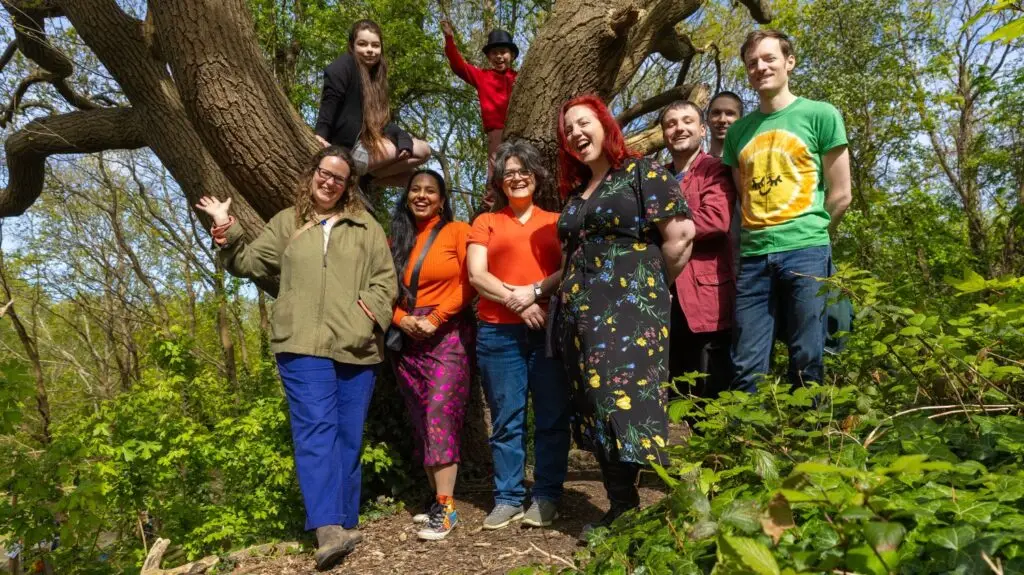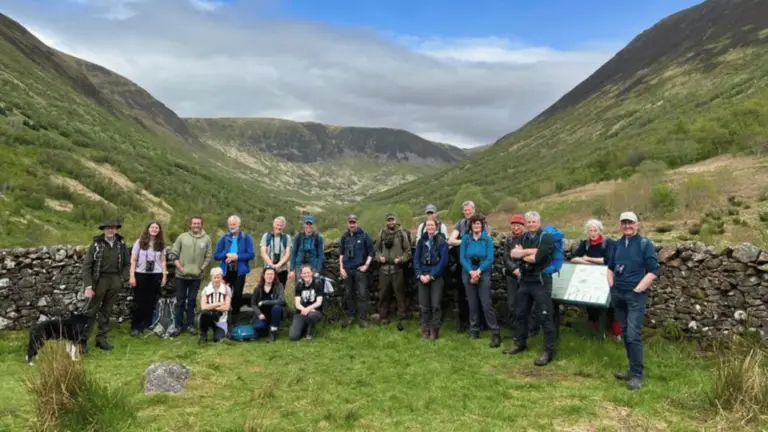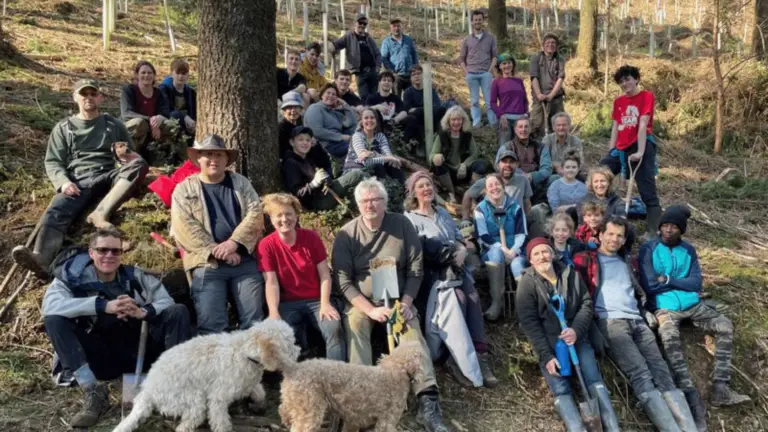If you take a train south from London Bridge station you may just catch a glimpse of Gorne Wood, a flash of green beside the tracks as you rattle between Brockley and Honor Oak Park. The three-acre wood in Lewisham is one of the last remaining patches of what was once a swathe of ancient woodland covering southeast London.
Until it was sold off by railway administrators in the 1980s Gorne Wood was an important part of the community, with a scout hut built among its 300-year-old sweet chestnut trees. After the sale the land was fenced off, the scouts were evicted, and residents have had to fight off two applications to bulldoze it for housing. Left undisturbed, the site has become a haven for wildlife, from tawny owls and sparrowhawks to newts and slow worms – all protected species.
In January 2022, fearing that pressure to build more homes would one day lead to the destruction of the wood, locals decided to act. After a year of old-fashioned fundraising, street parties, cake baking and sponsored bike rides they raised about £125,000 to save it. “It just kicked off, and everyone wanted to be part of it,” says Anna-Maria Cahalane, 50, a member of the Fourth Reserve Foundation, the campaign group that led the efforts. “I think that especially during Covid there was such a sense of injustice that green spaces were locked up.”
This kind of sentiment is spreading throughout the UK as communities, sick and tired of seeing valued open space sacrificed for development, take a stand. Rather than battle planning application after planning application they are raising impressive sums of money to preserve sacred land, similar to the way a village community would club together to save a shop or pub. For generations families have visited Weston Woods, a 20-acre green oasis just north of the West Yorkshire market town of Ofley. It is a place for rambling, dog walks and children to play, and particularly scenic in spring, when it is carpeted with bluebells and wild garlic. When the woodland was threatened the community rose up in protest and succeeded in raising more than £200,000 in just over a month.
The project to save Weston Woods began last February, when the privately owned site was put up for sale. A consortium of local nature and environmental groups was formed, and the campaign launched. “It really brought the local community together in quite an amazing, life-affirming way,” says Claire Blindell, 44, who works for two of the environmental organisations involved, Otley 2030 and the Yorkshire Rewilding Network. Over five hectic weeks 1,567 supporters donated £144,128 (plus about £30,000 in Gift Aid) in the crowdfunding campaign. “It was amazing,” Blindell says. “It felt a bit like David and Goliath, and we didn’t really think we had much of a chance. It wasn’t just how many people were giving, it was all the comments. People saying they remember playing in the woods when they were children and now take their grandchildren there. People saying the woods were essential for their mental health.”
The groups applied for an extra £29,000 from We Have the POWER, a philanthropic organisation that offers interest-free loans to environmental projects. Although multiple bidders were interested in acquiring Weston Woods – from timber companies to entrepreneurs keen to use it for motocross sports, dog training and pheasant shoots – they were outbid by the locals, who paid £206,550, plus VAT, for the land late last year. Since then a second funding drive has been launched to help to repay the loan, and volunteers are out in force in the woods, picking litter and repairing stone walls. “We want to make this woodland safe, and better for wildlife and for local people to come to,” Blindell says. She points out that although Otley is on the southern tip of the Yorkshire Dales, getting to the national park requires a car, and many of the houses in the town are back-to-back, with yards rather than gardens. “There is a real need for open space you can get to easily,” she says.
“This seems like a good way for land to be owned, by the community, in perpetuity.”
In February the community nature project Woodland Savers was launched to help neighbours to wrest open land from the hands of private owners. “We are seeking to be a catalyst,” says Christoph Warrack, the group’s chief executive officer. “It is about empowering communities and helping them to run their own projects. We can take away the challenge and the overwhelm, and give them the confidence to know that it is possible.”
Woodland Savers offers legal advice and help with writing a business plan or launching a crowdfunding campaign, and can put communities in touch with more than 500 potential funding organisations. It has secured a deal with the Esmee Fairbairn Foundation, one of the UK’s largest independent philanthropic organisations, which will match the funds a community can raise, effectively doubling their collection.
Two months in, and more than 20 groups are in contact with Warrack looking for help with their campaigns. These include the Friends of Severus Hill in Holgate, York – the land is named after the Roman emperor Septimius Severus. It is believed he was cremated on the hill there after his death in 211 BC. It is owned by Yorkshire Water’s property arm and has been fenced off with metal barriers for as long as anyone can remember. “It has, essentially, rewilded itself,” says Jo Patton, 37. Patton and his family moved to Holgate in 2017, the year that a planning application was lodged to build 43 homes on the four-acre site. Amid a clamour of local objection the plan was quashed.
Patton, who works for an education charity, started to take an interest in Severus Hill, researching its history and following the planning wrangle. Then, in October 2023, the hill was put up for sale. The newly formed Friends of Severus Hill has since been in a race against time to try to buy the site and turn it into a nature reserve. They were given a leg up by amenable Yorkshire Water, which agreed to pause the sale to give the group time to fundraise — a guide price of £168,000 has been mentioned. They have launched a not-for-profit organisation and built a website, but setting up a bank account was a complicated process, which meant their crowdfunder couldn’t go live until early April.
Their deadline for getting back to Yorkshire Water is June. Patton remains optimistic that Severus Hill can be saved and knows the stakes are high. “If we lose it and somebody builds on it then it is gone for ever,” he says. Back at Gorne wood, progress is in a simmarly frustrating holding pattern. The owner AA Homes & Housing, which acquired the site in 2004, has been approached by the Fourth Reserve Foundation but has not yet agreed to meet to discuss a sale. The company did not respond to requests for comment.
Lewisham council, meanwhile, is in the process of having the area designated Metropolitan Open Land, giving it some protection from development. After that it has pledged to issue a compulsory purchase order on the land. “Gorne Wood has gone through a long, slow period of neglect,” Cahalane says. “There is a ramshackle fence around it and the police are constantly being called out to deal with squatters.
“This campaign has been very hard work and a real learning curve. I now know much more about the planning system than I ever imagined.
The red tape is absolutely shocking. I can’t believe it is all taking so long, but it will be worth it. It is such a beautiful space.”
Read the Times article here



